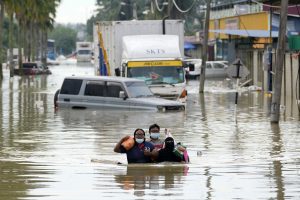At least 37 people have died and over 68,000 people have been evacuated from their homes in Malaysia as the country continues to battle its worst flooding in decades.
Local authorities first detected a tropical depression over the South China Sea nearly two weeks ago before it entered the east coast state of Pahang and drifted over the Malacca Strait, causing strong winds and torrential rain last weekend.
Heavy rains are not unusual during the year-end monsoon season, but the depression is rare, experts said. The deluge, affecting seven states across the peninsula, turned streets and entire neighborhoods into rivers.
Since the flood struck Klang Valley, the country’s industrial heartland, late on December 18, brave citizens and migrants have acted as emergency responders, rescuing people in boats from the rooftop of their inundated homes and offering food to households with young children and the elderly that do not have enough to eat as they waited to be rescued.
On Twitter, some users provided on-the-ground accounts, while others posted SOS alerts, donation drives, and emergency appeals to inform and mobilize volunteers and aid groups.
At community centers like the Gurdwara Sahib Petaling Jaya, people across racial and age groups banded together to cook, pack, and distribute hot vegetarian meals to flood victims, in the true spirit of “Keluarga Malaysia” (Malaysian Family) – the national slogan under Prime Minister Ismail Sabri Yaakob’s federal leadership.
In the eastern state of Pahang, where the flood death toll continues to rise, villagers have slowly begun to remove the muddy water clogging their homes and take stock of the flood damage. Many areas in the flood-prone state were cut off, as roads were impassable due to high waters, making relief efforts difficult.
With the weather bureau expecting thunderstorms and heavy rains to continue as the festive season looms, patience is running thin among flood victims and the public at large over the federal government’s scattered and lackadaisical response to the floods nearly a week on.
The phrase “Do Not Donate To Government” has been trending on Twitter amid growing frustration over the government’s slow response to distributing aid and other relief. People have called for donations to be channeled to civil societies instead.
The prime minister admitted to “weakness” in flood management and vowed improvement. However, he was quick to add that responsibility was not the federal government’s alone to bear, pointing to obligations held by state governments and frontline workers.
Unlike the government’s initial response to COVID-19 or the missing Malaysia Airlines flight MH370, which involved daily press briefings with an official spokesperson, the federal administration has offered no central communication – leaving people to scour social media for the latest updates on the floods.
Several news conferences were held, but all were done in silos, even among uniformed bodies. The National Disaster Management Agency (NADMA), in particular, has come under heavy fire for its apparent failure to coordinate rescue and relief missions during the floods. However, it has denied any delays on its part.
Instead, it has been a week of finger-pointing and blame games among top officials over who’s in charge and who is ultimately at fault for the lives lost and the damage caused by the disaster.
For too many times this year, Malaysians were left to fend for themselves in the face of hunger, and now, in dealing with a large-scale natural disaster.
Tashny Sukumaran, a senior analyst at the Institute of Strategic and International Studies (ISIS) Malaysia, tweeted on the night the floods struck, “When elections come, remember today.”

































